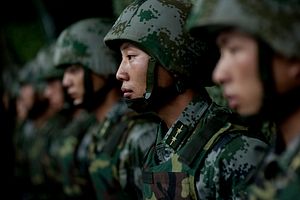Vice Chairman of the Central Military Commission Xu Qiliang wrote a piece in People’s Daily (Chinese) clarifying how the military would enact reforms in the wake of the Third Plenum. The fundamental goal is to increase the efficiency and battle-readiness of the military. According to Xu, there is still a large gap between China’s military and the world’s leading military (presumably a reference to the United States). Major goals of the reforms include fully bringing China’s military into the information age, revamping the command system for joint combat, and reforming the leadership structure.
However, Xu was very clear that the reforms would not include nationalizing China’s military, which still remains firmly under the Party’s control. Further proving this point, Xu announced that Xi Jinping’s corruption probe will extend to the military, focusing on “leading officers of the Communist Party of China within the army system.”
Military brass aren’t the only ones who might face reprimands from Xi and company. Reuters reports that China’s government is determined to push through the Third Plenum’s reforms, despite expected push-back from powerful interest groups. Reuters also reports Xi “plans to promote a string of allies in coming months as part of a sweeping reshuffle of the Communist Party, the government and the military.”
Earlier this month, Defense News scanned the 2013 U.S.-China Economic and Security Review Commission report for mentions of technological breakthroughs that worry the United States. The report noted recent upgrades to China’s nuclear submarines, bomber aircrafts, and ballistic missiles.
In Foreign Policy, Dan Lamothe notes that the newly released U.S.-China Economic and Security Review Commission report recommended an increased American military presence in the region in order to “offset China’s growing military capabilities.” He ties the report’s recommendation to U.S. anxiety over China’s military advances as well as an increasingly aggressive posture on territorial disputes. Yet the commission also wants to “strengthen strategic trust” by increasing military cooperation, which seems unlikely if U.S. military preparations continue to explicitly target China.
But let’s not get the impression that the report primarily focused on defense relations. In fact, the Commission’s longest list of recommendations was related to “China’s Agriculture Policy, Food Regulation, and the U.S.-China Agriculture Trade.” The full report is available online.
Meanwhile, The New York Times reports that for the first time in decades the U.S. and China are seeing their interests on climate change converge, which could help pave “the way for a new global climate change treaty in 2015.”
Finally, an oil pipeline blast in eastern China has killed at least 35 people and injured 166 others, according to Xinhua News Agency.
































